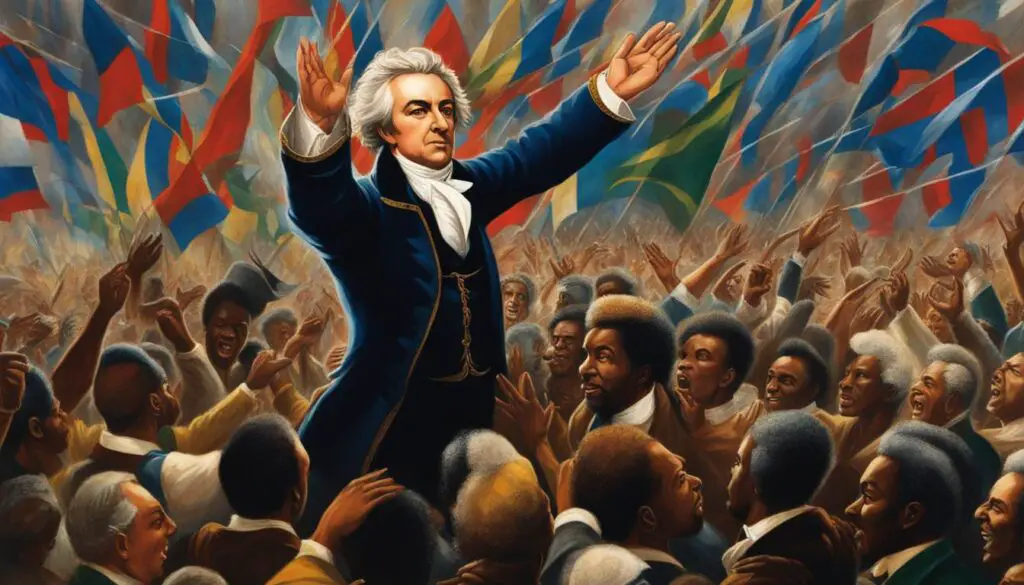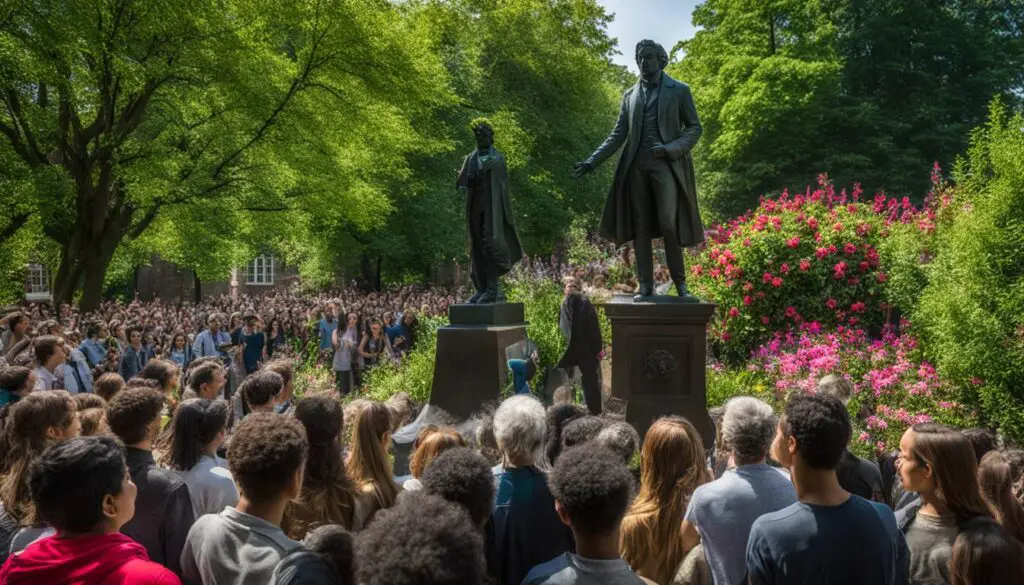William Wilberforce, a British abolitionist and social reformer, is widely recognized as a prominent figure in the fight against the slave trade in 18th-century England. His unwavering faith, dedication to human rights, and tireless efforts within the anti-slavery movement have left a lasting impact on society.
What inspired Wilberforce’s work was his deep-rooted belief in the inherent dignity and equality of all human beings. Motivated by his Christian faith and guided by his principles, he tirelessly fought against the injustices of the slave trade and spearheaded the parliamentary campaign for its abolition.
Throughout his career, Wilberforce faced numerous challenges and obstacles. He encountered strong opposition from powerful interests, both economic and political, who sought to preserve their profits and maintain the status quo. However, Wilberforce’s strong conviction and tenacity allowed him to overcome these challenges and continue his fight for justice.
Wilberforce’s key achievement was the passage of the Abolition Act of 1807, which marked a significant milestone in the abolition of the transatlantic slave trade. His speeches in Parliament, backed by first-hand evidence of the atrocities of the trade, mobilized public opinion and brought about widespread awareness and support for his cause.
Wilberforce’s core values and principles were deeply rooted in his faith. He believed in the importance of equality, justice, and compassion, and he dedicated his life to the pursuit of these values. He fought not only for the abolition of the slave trade but also for workers’ rights, animal welfare, and the reformation of societal conditions.
The impact of Wilberforce’s work extends far beyond his lifetime. His relentless advocacy and unwavering commitment to social reform have inspired generations of activists and continue to shape the fight for human rights and equality to this day.
William Wilberforce’s legacy is one of resilience, courage, and lasting change. His example serves as a powerful reminder that individuals can make a difference and effect meaningful societal transformation. His dedication to the abolitionist cause and his relentless pursuit of justice continue to inspire and motivate individuals worldwide.
Key Takeaways:
- William Wilberforce was a British abolitionist and social reformer who fought against the slave trade in 18th-century England.
- Wilberforce’s faith and principles guided his work, inspiring his dedication to human rights and the fight against injustice.
- Despite facing significant challenges, including powerful opposition, Wilberforce persevered and successfully led the parliamentary campaign to abolish the transatlantic slave trade.
- His key achievement was the passage of the Abolition Act of 1807, which marked a significant victory in the fight against the slave trade.
- Wilberforce’s legacy extends beyond his lifetime and continues to inspire activists to fight for human rights and equality.
Early Life and Spiritual Awakening
William Wilberforce, born in 1759 into a prosperous merchant family in Hull, England, experienced a profound spiritual awakening during his formative years. Growing up in Hull, a bustling port city, Wilberforce was exposed to the Evangelical movement, which emphasized personal conversion and faith in Christ. The Evangelical movement’s focus on spiritual renewal and the importance of social reform resonated deeply with Wilberforce, igniting a passion within him to fight for justice and equality.
At first, Wilberforce faced resistance from his family regarding his newfound commitment to his faith and social causes. However, he remained steadfast in his beliefs, embarking on a personal journey of spiritual growth and conviction. His encounter with Evangelicalism propelled him to seek a deeper understanding of his faith and its implications for society.
Wilberforce’s spiritual awakening spurred him to question the moral foundations of the world around him, driving him to reevaluate his role in effecting positive change. He firmly believed that his faith compelled him to advocate for social and moral reform, particularly in addressing the abhorrent practice of slavery.
“My walk is a public one,” Wilberforce once stated. “My business is in the world, and I must mix in the assemblies of men or quit the post which Providence seems to have assigned me.”
Wilberforce’s personal conversion and spiritual awakening set the stage for his lifelong dedication to fighting for justice and equality. His unwavering faith in God propelled him to become a prominent voice in the abolitionist movement, forever changing the course of history.

Entry into Politics
At the age of 21, William Wilberforce embarked on a remarkable political career, beginning with his election to the House of Commons. While initially known for his charming personality rather than his political convictions, Wilberforce’s journey in politics would soon be shaped by his faith and growing commitment to social reform.
One of the key factors that propelled Wilberforce’s political career was his friendship with the influential statesman, William Pitt. The bond between the two men allowed Wilberforce to establish important relationships within the political landscape, gaining access to powerful circles that would ultimately enable him to advocate for causes close to his heart.
Wilberforce’s charisma and ability to form influential relationships served as catalysts for his successful political ascent. As he deepened his commitment to social reform, his influential connections within the House of Commons allowed him to amplify his voice and champion causes that would reshape society.
Wilberforce’s entry into politics marked the beginning of his journey to effect lasting change. His faith and determination, combined with his influential relationships, laid the foundation for his future accomplishments in the realm of social justice.

| Inspirational Relationships | Key Achievements | Core Values |
|---|---|---|
| Friendship with William Pitt | Paved the way for his successful political career. | Faith and commitment to social reform. |
| Influential connections in the House of Commons | Enabled him to amplify his voice and advocate for social justice causes. | Equality, justice, and compassion. |
Championing the Abolitionist Cause
When William Wilberforce was approached by Thomas Clarkson and other anti-slave trade activists, he wholeheartedly agreed to lead the abolitionist cause in Parliament. Recognizing the urgency of the matter, Wilberforce presented first-hand evidence of the unspeakable atrocities committed in the slave trade.
The evidence had been meticulously collected by the Committee for the Abolition of the Slave Trade, and Wilberforce strategically used it to spark a growing awareness and outcry against this inhumane practice. In his passionate speeches in Parliament, he shed light on the harsh realities of the slave trade, making it difficult for his fellow parliamentarians to turn a blind eye.
Wilberforce’s tireless efforts in championing the abolitionist cause paved the way for the eventual abolition of the transatlantic slave trade. His ability to use first-hand evidence to paint a vivid picture of the horrors endured by enslaved individuals sparked a moral awakening in British society.
| Key Achievements | Impact on Society | Core Values and Principles |
|---|---|---|
|
|
|
Wilberforce’s unwavering dedication to the abolitionist cause and his use of first-hand evidence were instrumental in challenging the status quo and paving the way for significant change. His relentless efforts in Parliament and his ability to shed light on the harsh realities of the slave trade stirred the hearts and minds of the British public, igniting a powerful movement for freedom and justice.
Through his courageous actions, William Wilberforce left a profound legacy, shaping the trajectory of the fight against slavery and inspiring future generations to advocate for human rights and social justice.
Overcoming Challenges and Building Support
William Wilberforce faced formidable opposition in his crusade to abolish the slave trade. His efforts were met with resistance from powerful forces driven by economic interests and political challenges. Despite these obstacles, Wilberforce remained resolute, tirelessly presenting bills year after year to abolish the slave trade, even in the face of defeat.
Perhaps one of Wilberforce’s greatest strengths was his persistence and unwavering incremental support. He understood that change would not happen overnight and that it required a steady and persistent effort. His incremental approach allowed him to gradually build support and sway reluctant minds.
“It is necessary to have done with a great evil, and gradually to introduce the opposite good; to prepare men’s minds slowly and by degrees, for the general adoption and full establishment of the measures, which are in fact indispensable.”
Wilberforce’s dedication eventually paid off when the Abolition Act of 1807 was passed, ushering in a significant victory in the fight against the transatlantic slave trade. This landmark achievement was a direct result of Wilberforce’s ability to navigate the treacherous waters of opposition and galvanize public opinion.
Wilberforce’s success serves as a powerful testament to the idea that change is possible even in the face of seemingly insurmountable challenges. His ability to overcome opposition and build support stands as a remarkable example of perseverance and conviction.

Continuing the Fight for Emancipation
While the Abolition Act of 1807 marked a major victory in the fight against the slave trade, William Wilberforce understood that the battle for full emancipation was far from over. Determined to see the end of slavery throughout the British Empire, Wilberforce joined forces with the Society for the Abolition of the Slave Trade. Through his continued efforts, he sought to mobilize public opinion and rally support for the cause through powerful speeches, persuasive petitions, and impactful publications.

Despite facing fierce opposition from those who held economic and political interests in maintaining the institution of slavery, Wilberforce persevered. He recognized that by winning over public opinion and challenging societal norms, he could gradually overcome the opposition. His unwavering commitment to the abolitionist cause earned him the respect and admiration of like-minded individuals, both within and outside of Parliament.
Wilberforce’s campaign for emancipation eventually led to triumph with the passage of the Slavery Abolition Act in 1833. This legislation abolished slavery throughout the British Empire, setting a precedent for other nations to follow. The impact of this historic achievement cannot be overstated, as it brought freedom to countless enslaved individuals and serves as a testament to the power of perseverance in the face of adversity.
The Society for the Abolition of the Slave Trade
| Key Objectives | Impact |
|---|---|
| Mobilize public opinion through speeches, petitions, and publications | Raised awareness about the atrocities of slavery and garnered support for abolition |
| Advocate for legislative change | Influenced lawmakers to pass the Slavery Abolition Act of 1833 |
| Strategize and collaborate with other abolitionist groups | Strengthened the abolitionist movement and facilitated coordinated efforts |
Despite facing opposition and overcoming countless challenges along the way, William Wilberforce’s tireless efforts paved the way for the eventual emancipation of all slaves. His dedication to the cause, unwavering determination, and innovative methods of mobilizing public opinion have left an indelible mark on history. Wilberforce’s legacy serves as a reminder that even in the face of seemingly insurmountable obstacles, one person’s relentless pursuit of justice can bring about lasting change.
Legacy of Social Reform
Throughout his life, William Wilberforce was dedicated to more than just the abolition of the slave trade. He fought tirelessly for the reformation of manners and the improvement of societal conditions in Britain. Wilberforce’s efforts, alongside the work of other reformers, contributed to significant changes in British society, leaving a lasting legacy of social reform.
William Wilberforce was not content with simply addressing the issue of slavery; he recognized that true societal transformation required a broader focus. He championed causes such as workers’ rights, animal welfare, and the abolition of prostitution. Wilberforce’s dedication to these social issues stemmed from his unwavering belief in the inherent worth and dignity of all individuals.
Wilberforce’s commitment to the reformation of manners was driven by his conviction that societal transformation required more than just legislative change. He understood that true reform began with a change in attitudes, behaviors, and societal norms. Wilberforce believed that by promoting moral values, educating the public, and advocating for ethical conduct, he could create a more just and compassionate society.
Wilberforce’s work in improving societal conditions went beyond the borders of Britain. He was instrumental in the founding of organizations that aimed to address social issues across the globe. His dedication to social reform inspired others to join the cause and resulted in the establishment of institutions committed to furthering his mission.
Today, William Wilberforce’s legacy lives on in the continued fight for social justice and equality. His dedication to addressing a wide range of social issues serves as a reminder that meaningful change requires a holistic approach. Wilberforce’s unwavering commitment to social reform and his impact on British society inspire us to actively engage in shaping a better and more equitable future for all.
William Wilberforce’s legacy remains a testament to the power of individuals to effect change and the enduring impact of their dedication to social issues. His efforts paved the way for future generations of activists, reminding us that societal transformation is possible through perseverance, empathy, and a deep-seated commitment to the welfare of others. Wilberforce’s tireless advocacy for the reformation of manners and his fight for societal improvements continue to inspire us to work towards a more compassionate and just world.

Core Values and Principles
William Wilberforce’s tireless fight against the slave trade was grounded in his core values and principles, which were deeply rooted in his faith. His unwavering belief in the inherent equality and dignity of all human beings fueled his commitment to justice, compassion, and social reform.
Wilberforce understood that it was his moral duty to address the injustices perpetrated through the slave trade, and he refused to remain silent in the face of such atrocities. His deeply held convictions guided his every action, empowering him to challenge the status quo and advocate for change.
“Our motto must continue to be perseverance. And ultimately I trust the Almighty will crown our efforts with success.”
Wilberforce’s belief in the fundamental equality of all individuals played a significant role in his fight against the slave trade. He recognized that every human being, regardless of their race or social status, deserved to be treated with dignity and respect. This conviction fueled his tireless efforts to abolish the transatlantic slave trade, ultimately leading to the passage of the Abolition Act of 1807.
Driven by empathy and compassion, Wilberforce sought to alleviate the suffering of those enslaved and to restore their God-given rights. He saw the injustice and suffering caused by the slave trade and was unwavering in his resolve to bring about change. Wilberforce’s moral values impelled him to challenge the prevailing systems of injustice and to work towards a society that upheld the principles of equality and justice for all.
Wilberforce’s adherence to his core values and principles enabled him to overcome countless challenges. He faced opposition from vested interests and endured personal attacks, yet he remained steadfast in his pursuit of justice. His faith and unyielding commitment empowered him to weather the storms of adversity and to persist in his campaign against the slave trade.
Wilberforce’s determination and resilience paved the way for legislative changes that transformed society. His advocacy for social reform extended beyond the abolition of the slave trade, encompassing issues such as worker’s rights, animal welfare, and the abolition of prostitution. His legacy serves as a testament to the power of moral values and the immense impact individuals can have when they are driven by faith, equality, justice, compassion, and moral values.
Inspiration and Impact on Society
William Wilberforce’s unwavering faith and dedication to social justice continue to inspire people around the world. His fight against the slave trade and his commitment to equality have had a profound impact on society, serving as a reminder of the power of individuals to effect change. Wilberforce’s legacy serves as a testament to the importance of standing up for what is right and pursuing justice for all.
Wilberforce’s journey began with a deep-seated belief in the inherent worth and dignity of every human being. Inspired by his faith and convictions, he dedicated his life to fighting for equality and social justice. His unwavering commitment and tireless efforts were instrumental in igniting a movement for change.
Through his powerful speeches and impassioned advocacy, Wilberforce was able to convince others of the need to abolish the slave trade. His impact reached far beyond the walls of Parliament, resonating with people from all walks of life. The ripple effect of his influence can still be felt today.
“You may choose to look the other way, but you can never say again that you did not know.” – William Wilberforce
Wilberforce’s legacy extends beyond his successful campaign to abolish the slave trade. His work paved the way for broader social reforms and awakened society to the need for change. His fight for equality and justice remains an inspiration for future generations.
| Area of Impact | Description |
|---|---|
| Abolition of the Slave Trade | Wilberforce’s relentless campaigning and advocacy led to the passage of the Abolition Act of 1807, marking a significant victory in the fight against the transatlantic slave trade. |
| Inspiration for Future Activists | Wilberforce’s unwavering dedication and perseverance continue to inspire activists around the world in their fight for equality and social justice. |
| Legacy of Social Reform | Wilberforce’s work laid the foundation for significant social reforms, including workers’ rights, animal welfare, and the abolition of prostitution, leaving a lasting impact on British society. |
Wilberforce’s core values and principles, rooted in his faith, shaped his advocacy for social reform. His belief in the inherent equality and worth of every individual, coupled with his unwavering commitment to justice, guided his fight for a more just and equal world.
Inspired by Wilberforce’s example, we can learn the power of individual action and the influence it can have on society. His story serves as a reminder that change is possible, even in the face of seemingly insurmountable challenges. Wilberforce’s legacy is a call to stand up for what is right and to pursue justice and equality for all.
Lessons from Wilberforce’s Example
William Wilberforce’s extraordinary life and work offer valuable lessons that continue to resonate with us today. His unwavering perseverance in the face of opposition teaches us the importance of staying committed to a cause, even when the odds seem insurmountable. Despite enduring years of resistance and setbacks, Wilberforce remained steadfast in his conviction that the slave trade must be abolished.
Wilberforce’s ability to influence others is another crucial lesson we can learn from his example. Through his eloquent speeches and tireless advocacy, he sparked a movement that captured the hearts and minds of countless individuals. His unyielding conviction and unwavering dedication to a cause greater than himself empowered others to join his fight against the atrocities of the slave trade.
“Let everyone regulate their conduct by the golden rule of doing to others as in similar circumstances they would have done to them, and the path of duty will be clear before them.”
Wilberforce’s dedication to a cause greater than himself serves as an inspiration for us all. He never wavered in his pursuit of justice and equality, tirelessly working to bring about lasting change. His selflessness and determination inspire us to remain focused on our own causes, no matter how challenging the journey may be.
Ultimately, we can learn from Wilberforce’s example that change is possible, even in the face of seemingly insurmountable obstacles. His perseverance, conviction, influence, and dedication to the abolitionist cause have left an indelible mark on history. By following in his footsteps, we can create a better, more just world for future generations.
Continuing the Legacy
William Wilberforce’s legacy lives on in the modern-day fight against human rights abuses and social injustices. His example serves as a call to action for individuals to continue the work of social reform and to advocate for the rights and dignity of all people.
Inspired by Wilberforce’s commitment to abolition and social change, activists today strive for a more just and equal world. They draw strength from his unwavering dedication to the cause and his relentless efforts to challenge societal norms. By continuing his legacy, they aim to create a society that upholds human rights and works towards the eradication of injustices.
The Impact of Modern-Day Abolition
In today’s world, the fight for human rights and social reform encompasses a broad range of issues, including modern-day slavery, gender inequality, racial discrimination, and environmental degradation. Advocates inspired by Wilberforce’s legacy employ various forms of activism to address these pressing challenges.
Through grassroots movements, social media campaigns, advocacy groups, and legal initiatives, modern-day abolitionists are striving to eradicate slavery in all its forms and protect the most vulnerable members of society. They work tirelessly to ensure that every individual is afforded their basic human rights and that justice prevails over oppression.
Just as Wilberforce faced opposition and obstacles, modern-day activists also encounter resistance. However, like him, they remain undeterred in their pursuit of social justice, using their voices and platforms to bring attention to the injustices they fight against.
The Power of Social Reform and Activism
William Wilberforce’s legacy embodies the profound impact that one individual can make in the world. His inspiring example encourages activists to never underestimate their ability to effect change.
By standing up for what is right, raising awareness, challenging oppressive systems, and advocating for policy reforms, modern-day activists honor Wilberforce’s legacy. They use their talents, knowledge, and platforms to shine a light on social injustices and to empower others to take action. Their dedication to human rights and social reform is a testament to the enduring relevance of Wilberforce’s work and the lasting impact he has had on society.
As individuals carry on Wilberforce’s legacy, they are not only combating injustice but also inspiring future generations to confront the pressing issues of their time. They demonstrate the power of collective action and the ability of individuals to shape a better world through their tireless efforts and unwavering conviction.
To truly honor William Wilberforce, it is essential to continue the legacy of social reform and activism by fighting for a world where all individuals are treated with dignity and respect. Only through the ongoing commitment of individuals and communities can we achieve a future that reflects the values and principles Wilberforce championed throughout his life.
Conclusion
William Wilberforce’s unwavering faith and tireless advocacy for the abolition of the slave trade have cemented his status as an inspirational figure in the fight for social reform. His remarkable ability to overcome challenges and his lasting impact on society serve as a powerful testament to the transformative power of individuals in effecting change.
Wilberforce’s dedication to his cause was rooted in his unwavering belief in the inherent equality and dignity of all human beings. Guided by his core values of justice and compassion, he relentlessly fought against the atrocities of the slave trade and tirelessly advocated for the rights of the oppressed. His influential role in the passage of the Abolition Act of 1807 and the subsequent Slavery Abolition Act of 1833 demonstrated that perseverance and conviction can triumph over even the most formidable opposition.
Wilberforce’s legacy extends far beyond the abolitionist movement. His commitment to social reform and his advocacy for workers’ rights, animal welfare, and the eradication of prostitution have had a lasting impact on British society. His principles of equality and justice continue to inspire and mobilize individuals around the world in their own fights against injustice. The legacy of William Wilberforce serves as a powerful reminder that one person can make a significant difference and change the course of history.
FAQ
Who was William Wilberforce?
William Wilberforce was a British abolitionist and social reformer who played a pivotal role in the fight against the slave trade in 18th-century England.
What is the Clapham Sect?
The Clapham Sect was a group of like-minded individuals, including William Wilberforce, who were united by their evangelical faith and shared commitment to social reform.
What was William Wilberforce known for?
William Wilberforce was known for his parliamentary campaign against the slave trade and his dedication to human rights and social justice.
When was William Wilberforce born?
William Wilberforce was born in 1759 in Hull, England.
What role did William Wilberforce play in the fight against the slave trade?
William Wilberforce led the parliamentary campaign to abolish the transatlantic slave trade, presenting evidence of its atrocities and advocating for its abolition.
Did William Wilberforce succeed in abolishing the slave trade?
Yes, William Wilberforce’s persistence and incremental support eventually led to the passage of the Abolition Act of 1807, which abolished the transatlantic slave trade in the British Empire.
What other causes did William Wilberforce champion?
William Wilberforce also advocated for workers’ rights, animal welfare, and the abolition of prostitution, among other social reform causes.
How did William Wilberforce’s faith influence his work?
William Wilberforce’s faith in God informed his belief in the inherent equality and dignity of all human beings, inspiring his commitment to justice and compassion.
What is William Wilberforce’s legacy?
William Wilberforce’s legacy includes inspiring the fight for social justice, serving as a reminder of the power of individuals to effect positive change in society.
How can we learn from William Wilberforce’s example?
We can learn from William Wilberforce’s example by staying committed to a cause, being guided by personal conviction, and never giving up in the pursuit of justice and equality.
How does William Wilberforce’s legacy continue today?
William Wilberforce’s legacy continues through ongoing efforts to combat human rights abuses, promote social reform, and advocate for a more just and equal world.

